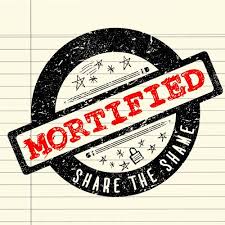In the last few weeks I’ve been listening to the Mortified podcast,

which features adults reading their adolescent diaries in front of a live audience, with no exaggeration, no embellishment, “just god-given awkwardness”. Every episode is guaranteed to produce cringing smiles.
I kept a diary of my own for six years, running from grade nine through my first year of university. I wrote in thin, stapled Hilroy notebooks

every night before bed, chronicling everything from my first part time job to my crush on John Waite, and from the trailing wreckage of my first love to deciding which university I wanted to go to. Only a dozen or so notebooks survived all the house moves then, and I’ve gone back to reread them only once or twice in the intervening years. Plenty of the material would qualify for a Mortified podcast.
If we don’t reread our diaries, or when we do reread them it’s so embarrassingly funny that it’s worthy of mortification, why do we write in them?
A diary is very different from blogs and social media stream-of-thought because a diary has no intended audience other than the author. It doesn’t matter whether the words flow beautifully or even make sense. It’s just writing.

Many authors use a process similar to this. It’s called free writing, and it’s a great way to improve your writing. It involves writing whatever comes into your head with no limits and no rules. Some people put a time limit on it, like five minutes, and others will write until they run out of things to say. Free writing has many benefits:
- it relieves the pressure of writing well
- it regulates emotions
- it helps the author gain perspective
- it can get you past writer’s block
- it can show you new ideas you didn’t know you had
- it gets rid of the clutter in your brain
Give it a try. And if you want some inspiration, try listening to this this podcast (Episode 34, “I was a ten year old maid”). It’s pure, mortifying gold.